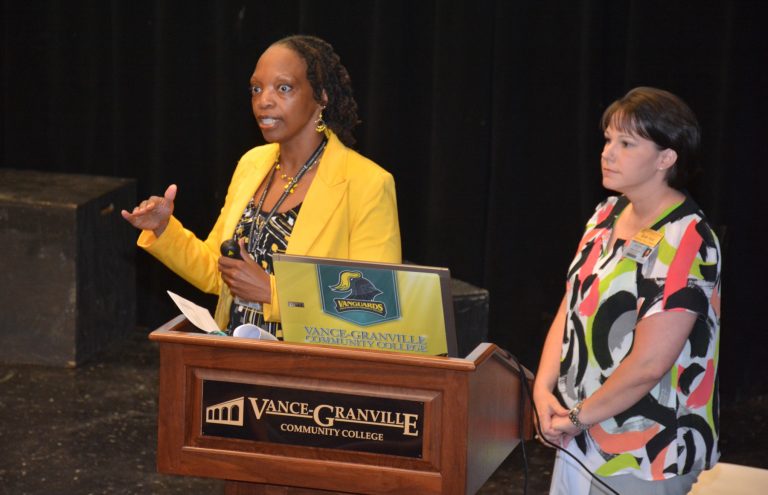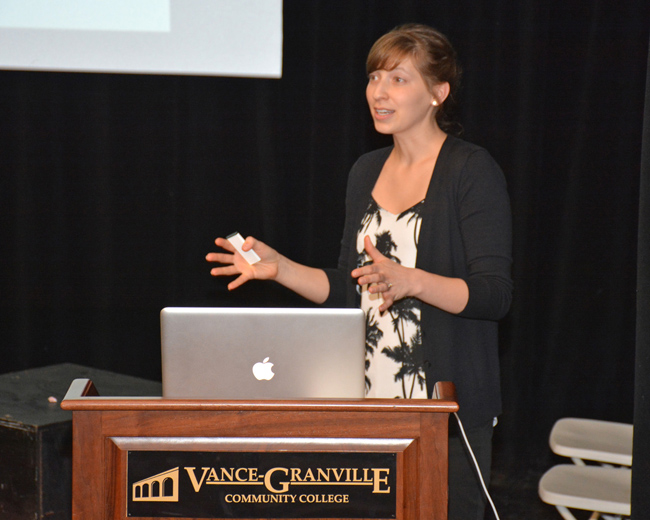VGCC “Money” lectures highlight economic issues

Vance-Granville Community College’s Arts and Sciences division offered an enlightening public lecture series during the spring semester on the theme of “money,” including issues of economic inequality. Faculty members from various departments within the division made presentations, applying their particular fields of expertise to the subject.
After hearing from Sociology and Art instructors in the first installment , the second lecture was presented by Erin Folz, a Mathematics instructor based at the college’s South Campus. Her presentation was entitled “Are the Rich Really Getting Richer? A Mathematical Look at Income Inequality.” Folz’s answer to the question was an emphatic “yes.” “The rich have been getting relatively richer all over world, no matter the country, since 1991, and the degree of increase is greater in the United States,” Folz said. “We have the second-highest level of economic inequality among developed countries.”
Folz described a variety of mathematical formulas that are used to calculate inequality, including the Lorenz Curve and the Gini index. She also offered statistics such as one showing that in 2012, the top .1% controlled 22% of the wealth in the United States. “That means the wealthiest 160,000 families own as much wealth as the poorest 145 million families,” Folz explained. She added that individuals can actually fight inequality on a local level by being responsible in their personal finances, saving money and investing in retirement accounts from an early age.
The final lecture in the series was entitled “Education on a Shoe String” and featured faculty members from the VGCC Early Childhood Education department: department chair Tracey Bennett and instructors Connie Lawhorn and Beth Vick. They focused their remarks on inequality in the field of care and education for children from birth to age eight. Bennett noted the national wage gap between men and women, even at the same level of education. This holds true in the early childhood education profession, she said. “Men in education tend to make more money, but ours is a predominantly female profession,” Bennett said. “We need more men in this field. Men don't seem to want to enter the field, and if they do, research shows they are likely to go into administration rather than remain a teacher.”
Bennett also noted that the state requires every worker in a licensed child care facility to have a minimum of one college course to obtain a credential. Having an associate degree significantly increases a person’s salary over the credential alone. The challenge, she said, is to raise salaries to encourage early childhood teachers to obtain more education and training. Vick noted that students do not go into the education field to make money. “This field requires you to have a truly special desire to want to invest in the future,” Vick said. She said that the need for quality early care and education is growing, with a large number of young children in area with two employed parents.
“Access to quality care and education remains out of reach for many families either because there aren't quality programs in the area or they cost too much,” Vick said. She said that research has demonstrated how important a child’s education before kindergarten is. Lawhorn concluded the session by noting that low wages in the profession can lead to high staff turnover, poor morale and poorer cognitive development for the children.
Above: From left, VGCC Education department chair Tracey Bennett of Durham and instructor Beth Vick of Boydton, Va., discuss economic issues in the care of young children. (VGCC photo)

Above: VGCC math instructor Erin Folz, a Raleigh resident, lectures on economic inequality.

